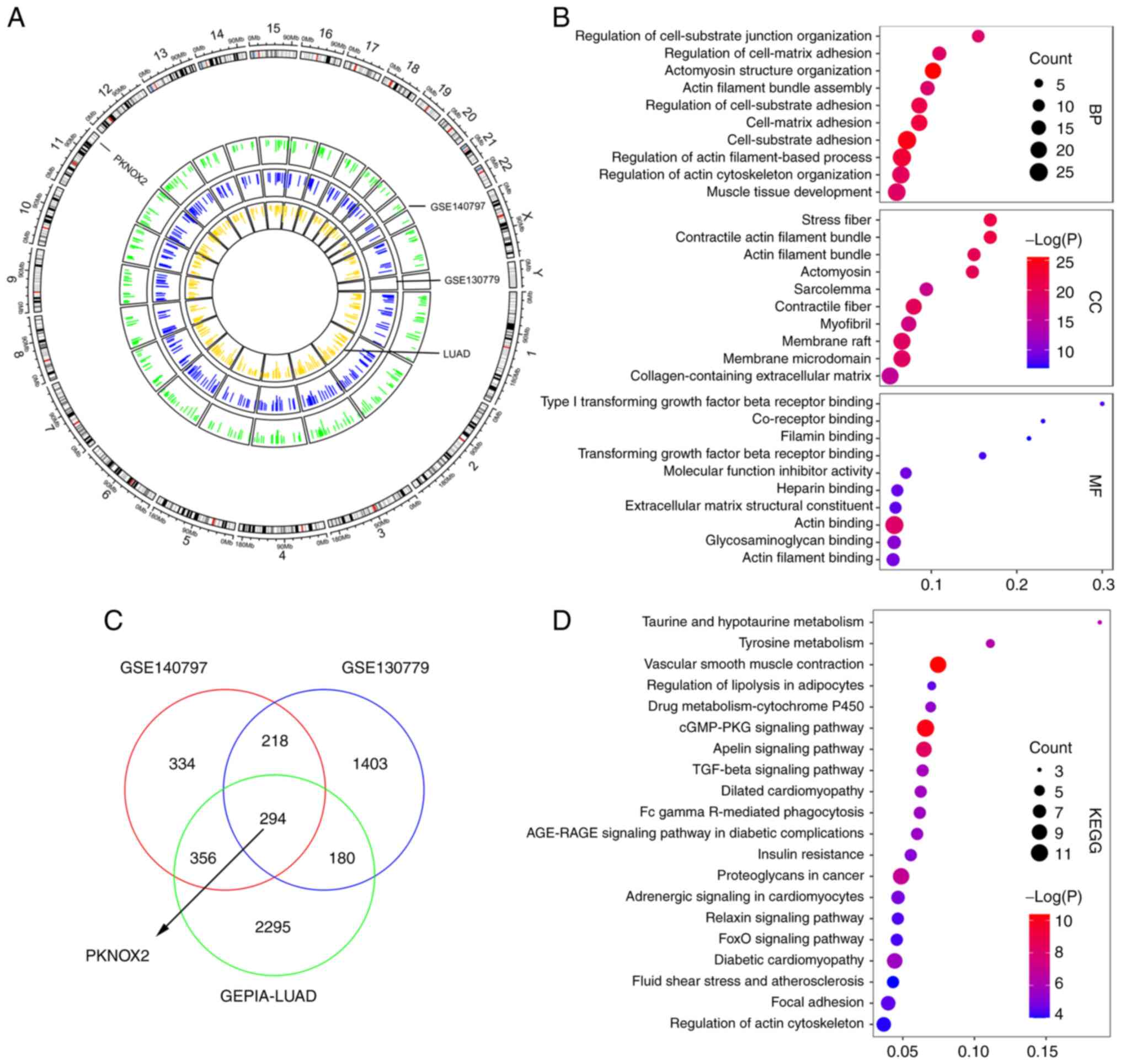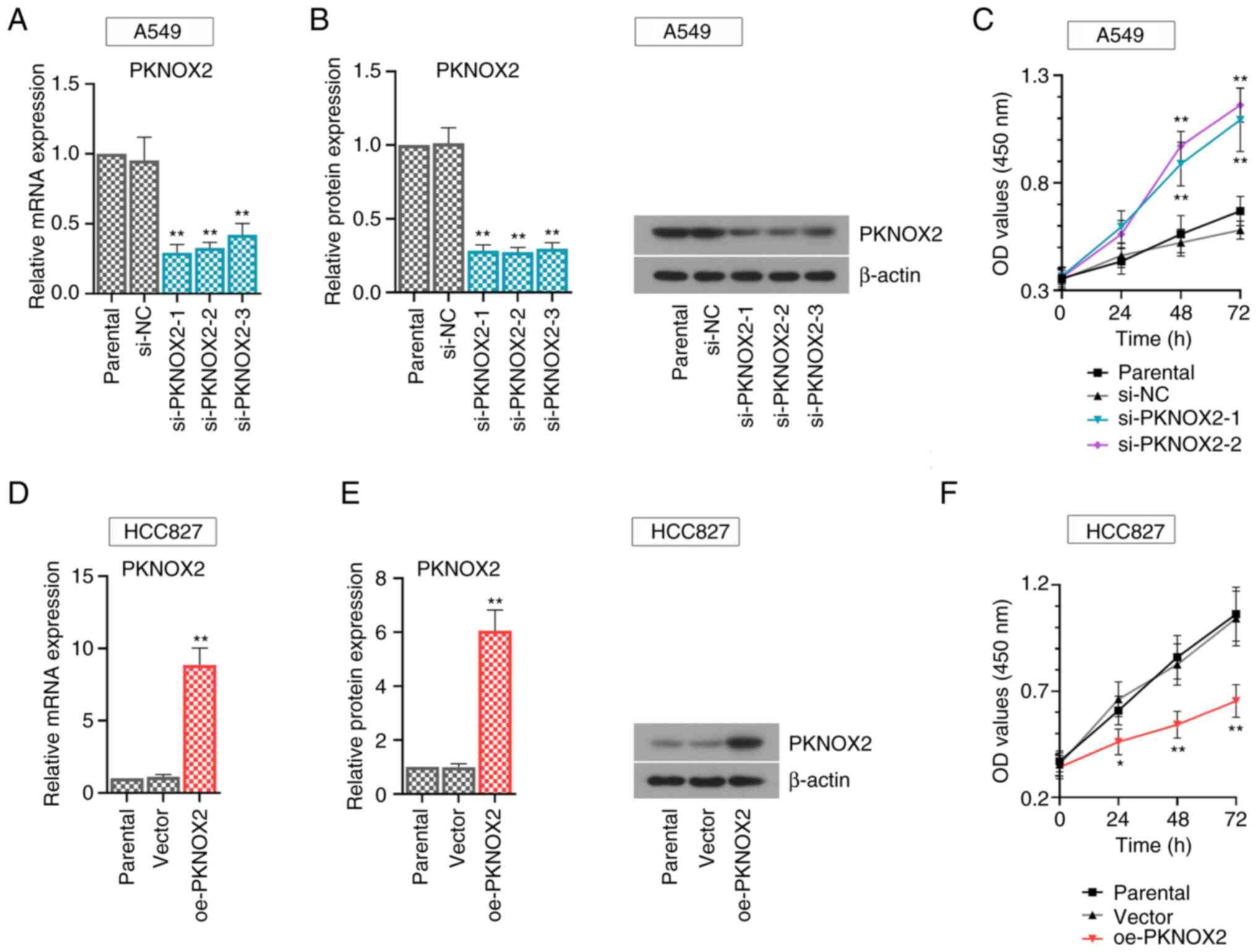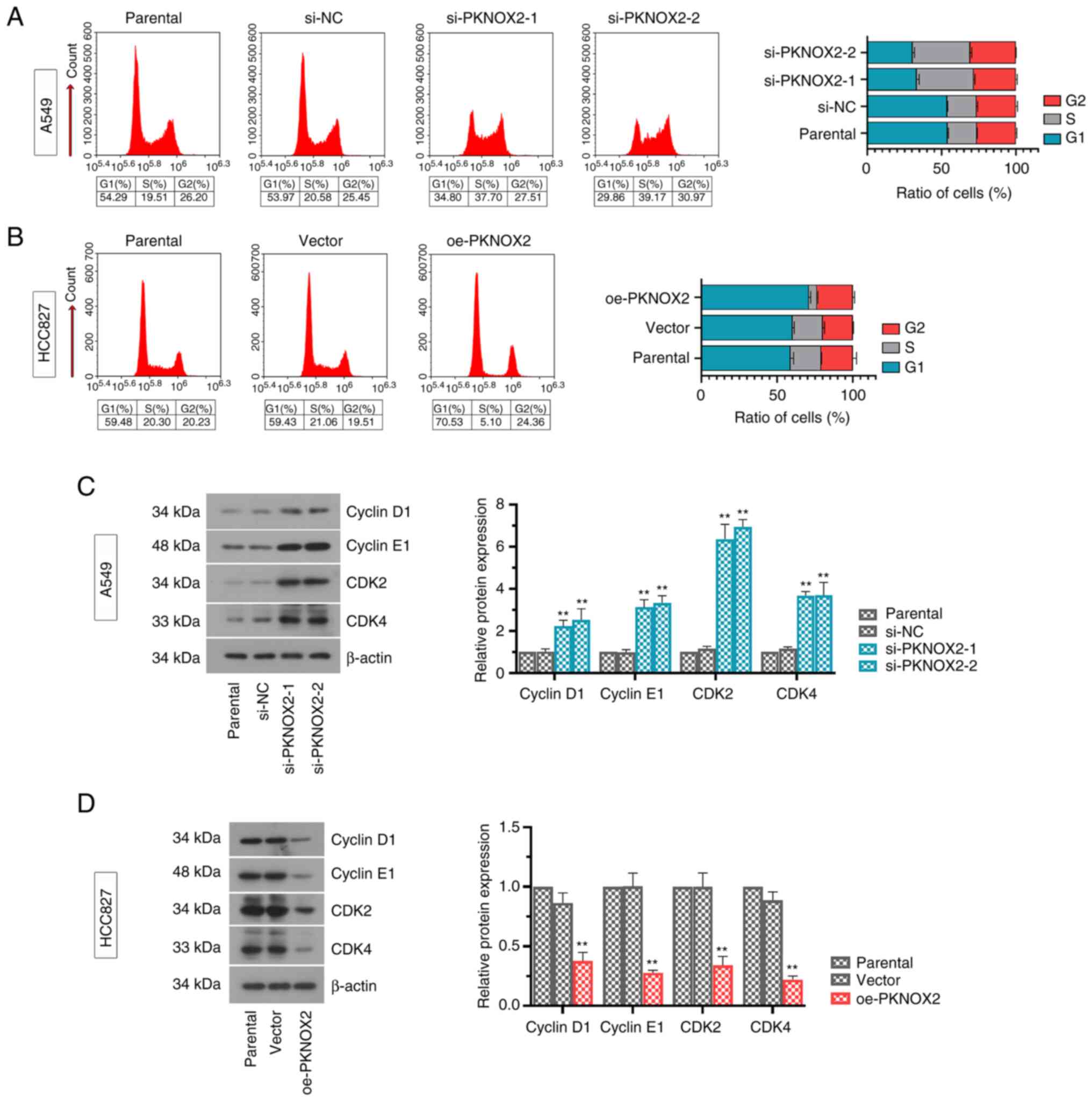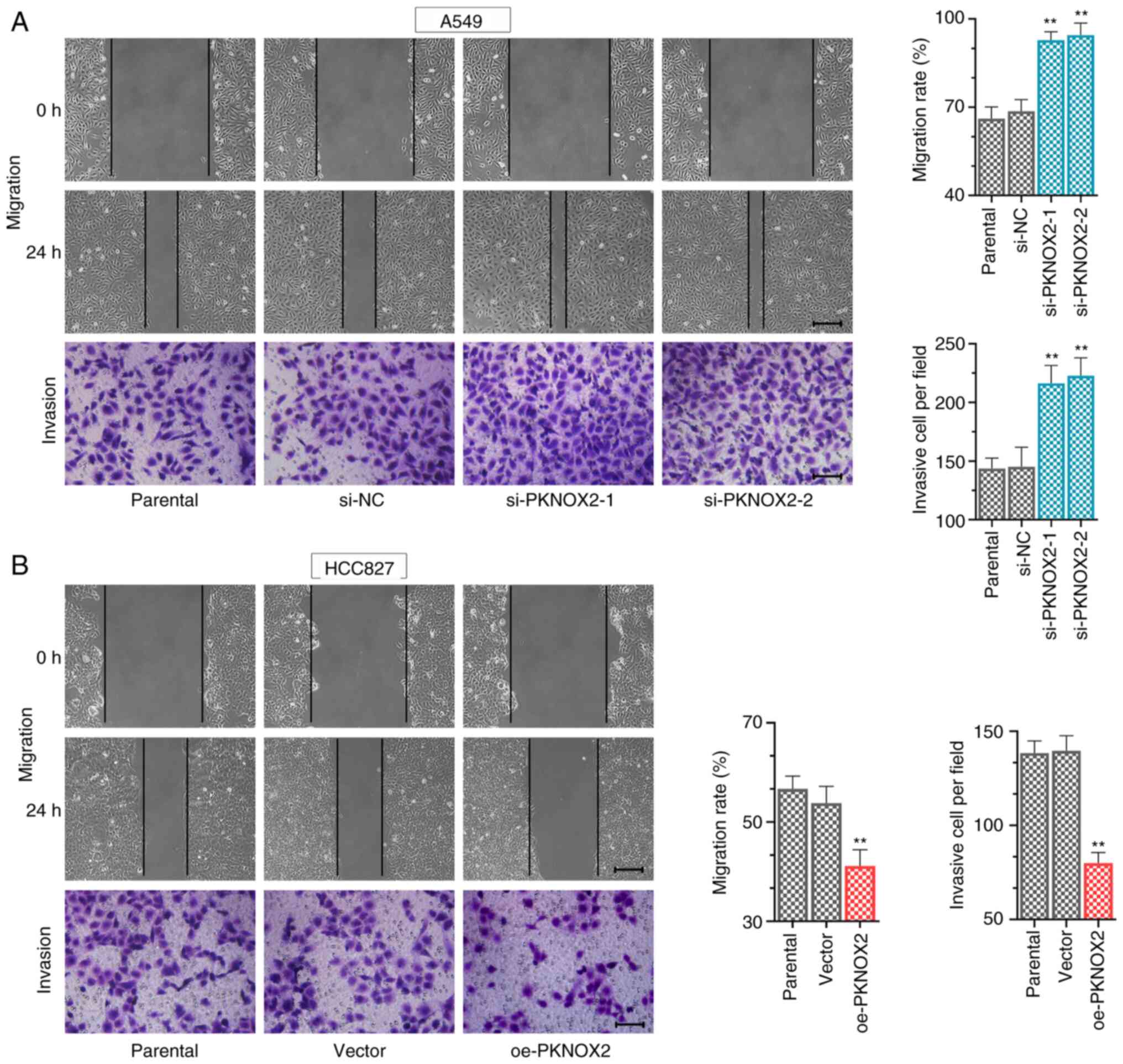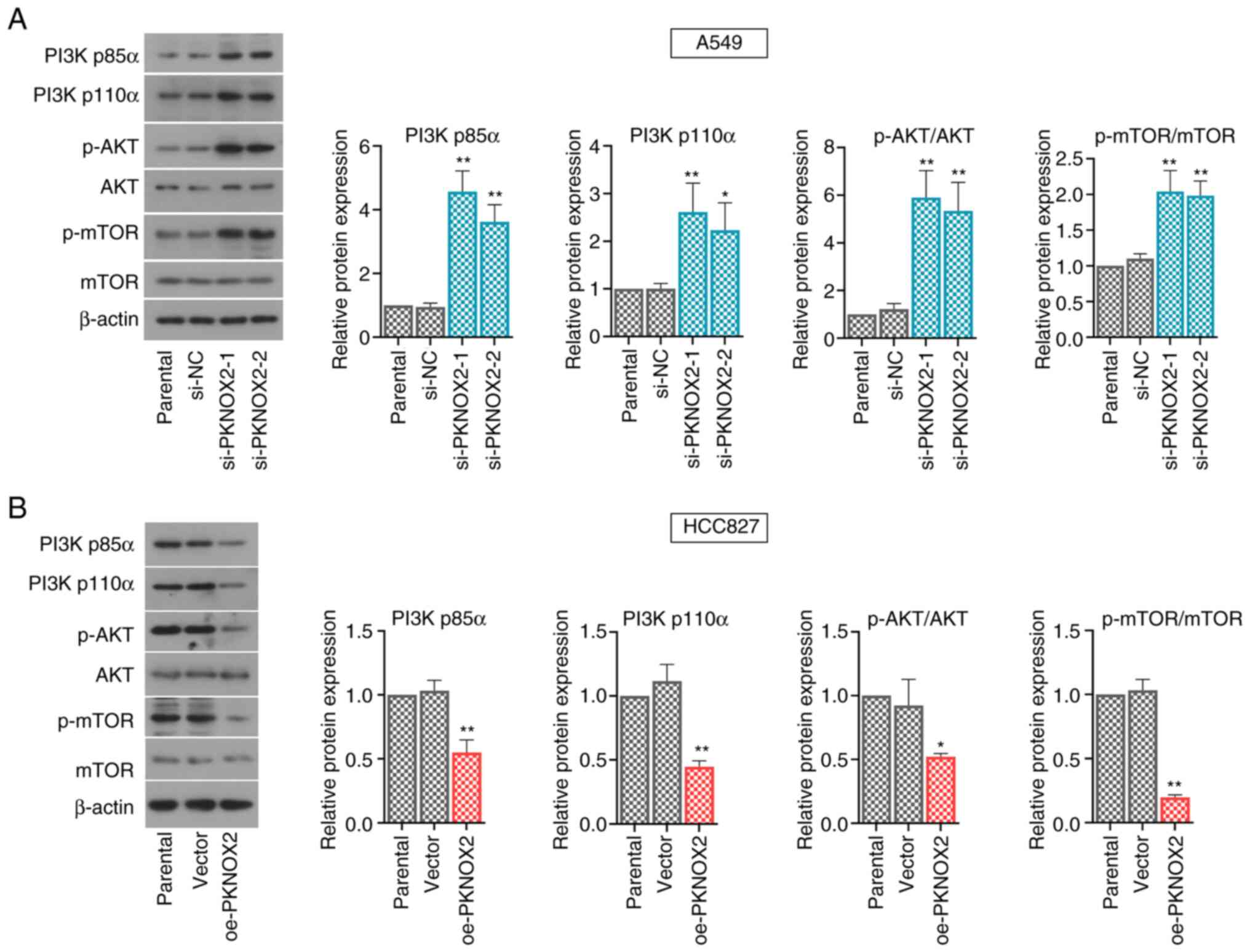|
1
|
Torre LA, Siegel RL and Jemal A: Lung
cancer statistics. Adv Exp Med Biol. 893:1–19. 2016.PubMed/NCBI View Article : Google Scholar
|
|
2
|
Mao Y, Yang D, He J and Krasna MJ:
Epidemiology of lung cancer. Surg Oncol Clin N Am. 25:439–445.
2016.PubMed/NCBI View Article : Google Scholar
|
|
3
|
Turner MC, Andersen ZJ, Baccarelli A,
Diver WR, Gapstur SM, Pope CAP III, Prada D, Samet J, Thurston G
and Cohen A: Outdoor air pollution and cancer: An overview of the
current evidence and public health recommendations. CA Cancer J
Clin 25: 10.3322/caac.21632, 2020.
|
|
4
|
Siegel RL, Miller KD, Fuchs HE and Jemal
A: Cancer statistics, 2021. CA Cancer J Clin. 71:7–33.
2021.PubMed/NCBI View Article : Google Scholar
|
|
5
|
Imoto I, Sonoda I, Yuki Y and Inazawa J:
Identification and characterization of human PKNOX2, a novel
homeobox-containing gene. Biochem Biophys Res Commun. 287:270–276.
2001.PubMed/NCBI View Article : Google Scholar
|
|
6
|
Moens CB and Selleri L: Hox cofactors in
vertebrate development. Dev Biol. 291:193–206. 2006.PubMed/NCBI View Article : Google Scholar
|
|
7
|
Capellini TD, Di Giacomo G, Salsi V,
Brendolan A, Ferretti E, Srivastava D, Zappavigna V and Selleri L:
Pbx1/Pbx2 requirement for distal limb patterning is mediated by the
hierarchical control of Hox gene spatial distribution and Shh
expression. Development. 133:2263–2273. 2006.PubMed/NCBI View Article : Google Scholar
|
|
8
|
Shah N, Wang J, Selich-Anderson J, Graham
G, Siddiqui H, Li X, Khan J and Toretsky J: PBX1 is a favorable
prognostic biomarker as it modulates 13-cis retinoic acid-mediated
differentiation in neuroblastoma. Clin Cancer Res. 20:4400–4412.
2014.PubMed/NCBI View Article : Google Scholar
|
|
9
|
Chen X, Cho K, Singer BH and Zhang H: The
nuclear transcription factor PKNOX2 is a candidate gene for
substance dependence in European-origin women. PLoS One.
6(e16002)2011.PubMed/NCBI View Article : Google Scholar
|
|
10
|
Zhang L, Li W, Cao L, Xu J, Qian Y, Chen
H, Zhang Y, Kang W, Gou YH, Wong CC and Yu J: PKNOX2 suppresses
gastric cancer through the transcriptional activation of IGFBP5 and
p53. Oncogene. 38:4590–4604. 2019.PubMed/NCBI View Article : Google Scholar
|
|
11
|
Banno K, Kisu I, Yanokura M, Tsuji K,
Masuda K, Ueki A, Kobayashi Y, Yamagami W, Nomura H, Tominaga E, et
al: Epimutation and cancer: A new carcinogenic mechanism of Lynch
syndrome (Review). Int J Oncol. 41:793–797. 2012.PubMed/NCBI View Article : Google Scholar
|
|
12
|
Wu JE, Wu YY, Tung CH, Tsai YT, Chen HY,
Chen YL and Hong TM: DNA methylation maintains the CLDN1-EPHB6-SLUG
axis to enhance chemotherapeutic efficacy and inhibit lung cancer
progression. Theranostics. 10:8903–8923. 2020.PubMed/NCBI View Article : Google Scholar
|
|
13
|
Zheng Y, Wang Z, Wei S, Liu Z and Chen G:
Epigenetic silencing of chemokine CCL2 represses macrophage
infiltration to potentiate tumor development in small cell lung
cancer. Cancer Lett. 499:148–163. 2021.PubMed/NCBI View Article : Google Scholar
|
|
14
|
Tan AC: Targeting the PI3K/Akt/mTOR
pathway in non-small cell lung cancer (NSCLC). Thorac Cancer.
11:511–518. 2020.PubMed/NCBI View Article : Google Scholar
|
|
15
|
Polivka J Jr and Janku F: Molecular
targets for cancer therapy in the PI3K/AKT/mTOR pathway. Pharmacol
Ther. 142:164–175. 2014.PubMed/NCBI View Article : Google Scholar
|
|
16
|
Zhao H, Chen G, Ye L, Yu H, Li S and Jiang
WG: DOK7V1 influences the malignant phenotype of lung cancer cells
through PI3K/AKT/mTOR and FAK/paxillin signaling pathways. Int J
Oncol. 54:381–389. 2019.PubMed/NCBI View Article : Google Scholar
|
|
17
|
Hu H, Wang F, Wang M, Liu Y, Wu H, Chen X
and Lin Q: FAM83A is amplified and promotes tumorigenicity in
non-small cell lung cancer via ERK and PI3K/Akt/mTOR pathways. Int
J Med Sci. 17:807–814. 2020.PubMed/NCBI View Article : Google Scholar
|
|
18
|
Alzahrani AS: PI3K/Akt/mTOR inhibitors in
cancer: At the bench and bedside. Semin Cancer Biol. 59:125–132.
2019.PubMed/NCBI View Article : Google Scholar
|
|
19
|
Okayama H, Kohno T, Ishii Y, Shimada Y,
Shiraishi K, Iwakawa R, Furuta K, Tsuta K, Shibata T, Yamamoto S,
et al: Identification of genes upregulated in ALK-positive and
EGFR/KRAS/ALK-negative lung adenocarcinomas. Cancer Res.
72:100–111. 2012.PubMed/NCBI View Article : Google Scholar
|
|
20
|
Liang J, Li H, Han J, Jiang J, Wang J, Li
Y, Feng Z, Zhao R, Sun Z, Lv B and Tian H: Mex3a interacts with
LAMA2 to promote lung adenocarcinoma metastasis via PI3K/AKT
pathway. Cell Death Dis. 11(614)2020.PubMed/NCBI View Article : Google Scholar
|
|
21
|
He F, Huang L, Xu Q, Xiong W, Liu S, Yang
H, Lu W, Xiao R, Hu Z and Cai L: Microarray profiling of
differentially expressed lncRNAs and mRNAs in lung adenocarcinomas
and bioinformatics analysis. Cancer Med. 9:7717–7728.
2020.PubMed/NCBI View Article : Google Scholar
|
|
22
|
Livak KJ and Schmittgen TD: Analysis of
relative gene expression data using real-time quantitative PCR and
the 2(-Delta Delta C(T)) method. Methods. 25:402–408.
2001.PubMed/NCBI View Article : Google Scholar
|
|
23
|
Ushijima T: Detection and interpretation
of altered methylation patterns in cancer cells. Nat Rev Cancer.
5:223–231. 2005.PubMed/NCBI View
Article : Google Scholar
|
|
24
|
Duan PJ, Zhao JH and Xie LL: Cul4B
promotes the progression of ovarian cancer by upregulating the
expression of CDK2 and CyclinD1. J Ovarian Res.
13(76)2020.PubMed/NCBI View Article : Google Scholar
|
|
25
|
Li S, Ma YM, Zheng PS and Zhang P: GDF15
promotes the proliferation of cervical cancer cells by
phosphorylating AKT1 and Erk1/2 through the receptor ErbB2. J Exp
Clin Cancer Res. 37(80)2018.PubMed/NCBI View Article : Google Scholar
|
|
26
|
Sun HB, Han XL, Zhong M and Yu DJ:
Linc00703 suppresses non-small cell lung cancer progression by
modulating CyclinD1/CDK4 expression. Eur Rev Med Pharmacol Sci.
24:6131–6138. 2020.PubMed/NCBI View Article : Google Scholar
|
|
27
|
Xi X, Teng M, Zhang L, Xia L, Chen J and
Cui Z: MicroRNA-204-3p represses colon cancer cells proliferation,
migration, and invasion by targeting HMGA2. J Cell Physiol.
235:1330–1338. 2020.PubMed/NCBI View Article : Google Scholar
|
|
28
|
Li X, Zhang Q, Fan K, Li B, Li H, Qi H,
Guo J, Cao Y and Sun H: Overexpression of TRPV3 correlates with
tumor progression in non-small cell lung cancer. Int J Mol Sci.
17(437)2016.PubMed/NCBI View Article : Google Scholar
|
|
29
|
Ratschiller D, Heighway J, Gugger M,
Kappeler A, Pirnia F, Schmid RA, Borner MM and Betticher DC: Cyclin
D1 overexpression in bronchial epithelia of patients with lung
cancer is associated with smoking and predicts survival. J Clin
Oncol. 21:2085–2093. 2003.PubMed/NCBI View Article : Google Scholar
|
|
30
|
Keum JS, Kong G, Yang SC, Shin DH, Park
SS, Lee JH and Lee JD: Cyclin D1 overexpression is an indicator of
poor prognosis in resectable non-small cell lung cancer. Br J
Cancer. 81:127–132. 1999.PubMed/NCBI View Article : Google Scholar
|
|
31
|
Reddy D, Kumavath R, Ghosh P and Barh D:
Lanatoside C induces G2/M cell cycle arrest and suppresses cancer
cell growth by attenuating MAPK, Wnt, JAK-STAT, and PI3K/AKT/mTOR
signaling pathways. Biomolecules. 27(792)2019.PubMed/NCBI View Article : Google Scholar
|
|
32
|
Zhang HQ, Xie XF, Li GM, Chen JR, Li MT,
Xu X, Xiong QY, Chen GR, Yin YP, Peng F, et al: Erianin inhibits
human lung cancer cell growth via PI3K/Akt/mTOR pathway in vitro
and in vivo. Phytother Res. 35:4511–4525. 2021.PubMed/NCBI View
Article : Google Scholar
|
|
33
|
Zhao YY, Jia J, Zhang JJ, Xun YP, Xie SJ,
Liang JF, Guo HG, Zhu JZ, Ma SL and Zhang SR: Inhibition of
histamine receptor H3 suppresses the growth and metastasis of human
non-small cell lung cancer cells via inhibiting PI3K/Akt/mTOR and
MEK/ERK signaling pathways and blocking EMT. Acta Pharmacol Sin.
42:1288–1297. 2021.PubMed/NCBI View Article : Google Scholar
|
|
34
|
Sarris EG, Saif MW and Syrigos KN: The
biological role of PI3K pathway in lung cancer. Pharmaceuticals
(Basel). 5:1236–1264. 2012.PubMed/NCBI View Article : Google Scholar
|
|
35
|
Tsurutani J, Fukuoka J, Tsurutani H, Shih
JH, Hewitt SM, Travis WD, Jen J and Dennis PA: Evaluation of two
phosphorylation sites improves the prognostic significance of Akt
activation in non-small-cell lung cancer tumors. J Clin Oncol.
24:306–314. 2006.PubMed/NCBI View Article : Google Scholar
|
|
36
|
Ekman S, Wynes MW and Hirsch FR: The mTOR
pathway in lung cancer and implications for therapy and biomarker
analysis. J Thorac Oncol. 7:947–953. 2012.PubMed/NCBI View Article : Google Scholar
|
|
37
|
Galvan A, Colombo F, Noci S, Pazzaglia S,
Mancuso M, Manenti G, Broman KW, Saran A and Dragani TA: The Lsktm1
locus modulates lung and skin tumorigenesis in the mouse. G3
(Bethesda). 2:1041–1046. 2012.PubMed/NCBI View Article : Google Scholar
|
|
38
|
Chen X, Yu Q, Pan H, Li P, Wang X and Fu
S: Overexpression of IGFBP5 enhances radiosensitivity through
PI3K-AKT pathway in prostate cancer. Cancer Manag Res.
12:5409–5418. 2020.PubMed/NCBI View Article : Google Scholar
|















